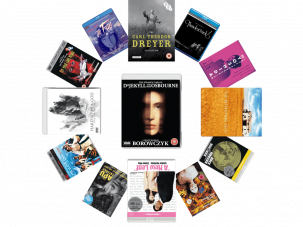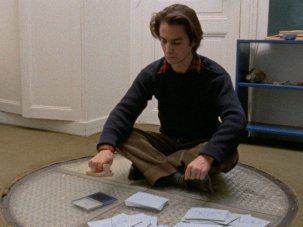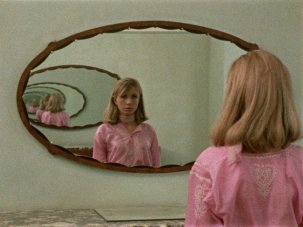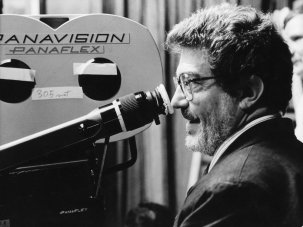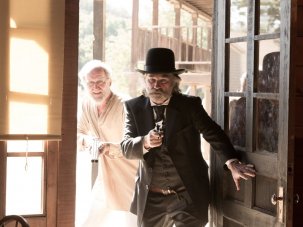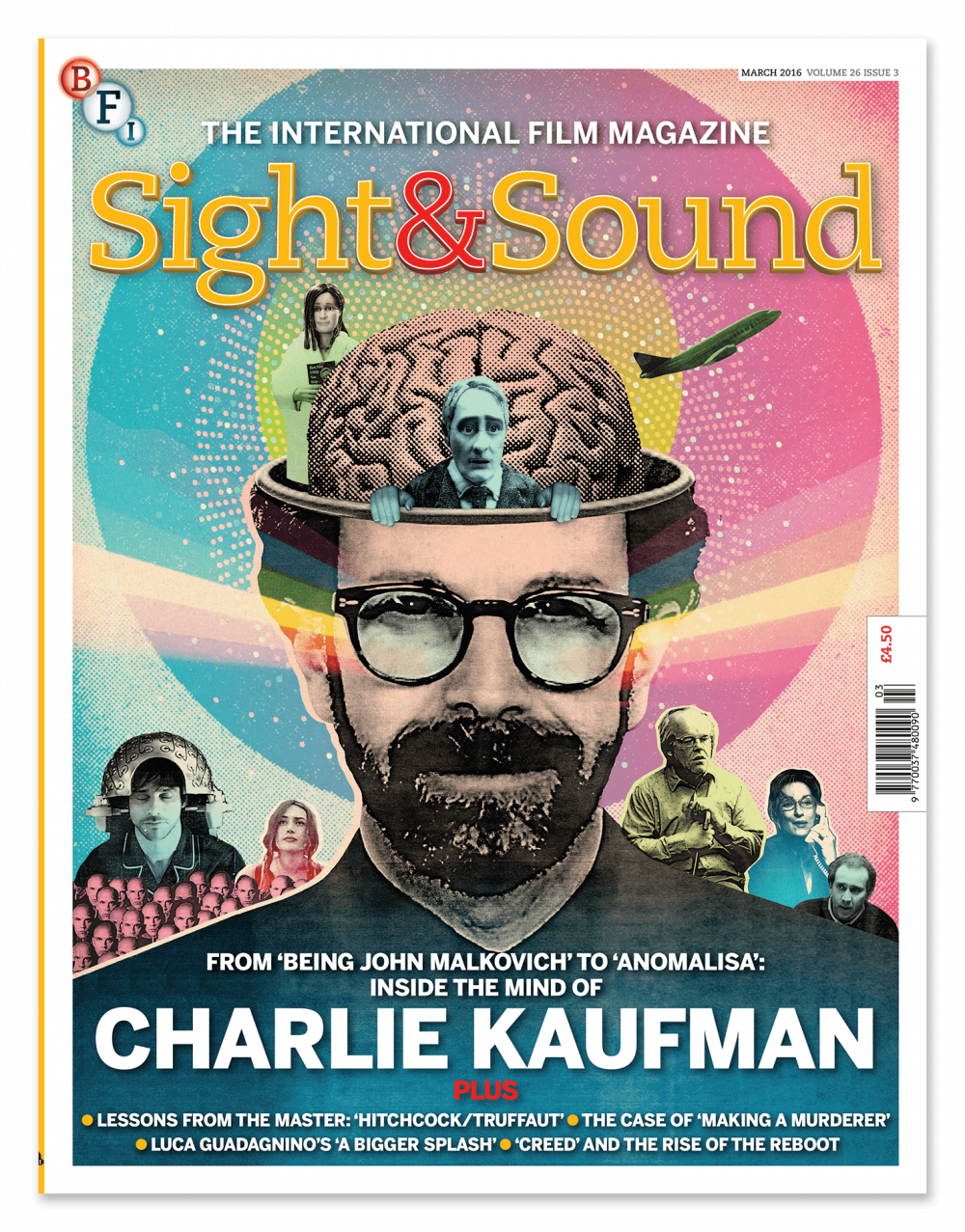
As our buoyantly expressive cover so boldly proclaims, the Sight & Sound March issue undertakes to delve into the head of Charlie ‘Being John Malkovich’ Kaufman, arguably contemporary American cinema’s most out-there writer and director – angst-ridden, wildly inventive explorer of interior continents and wrestler with the big themes of human identity and agency. His latest film Anomalisa is no exception, but with one glaring difference – it’s a stop-motion tale of a self-help author’s existential crisis made with high-tech dolls, whose 3D printed features give eerie expression to the by-now trademark anomie and dissociation. Jonathan Romney surveys the Kaufman oeuvre to date, while Nick Bradshaw chats with both Kaufman and doll-maker collaborator Duke Johnson.
Posted to subscribers and available digitally 5 February
→ Buy a print copy
→ Access the digital edition
→
On UK newsstands 9 February
Star Wars, Creed, Point Break – Hollywood seems awash with recycled properties reinventing well-known stories and characters for both new and nostalgic generations, but is this tendency more prolific than hitherto? And is it necessarily a bad thing? Nick Pinkerton ponders whether ‘pop culture is sagging under the burden of its own accumulated past’, and draws some surprising conclusions.
Film critic/programmer and S&S contributor Kent Jones’s absorbing documentary Hitchcock/Truffaut reconstructs the latter’s attempt to have the former recognised as a bona fide artist rather than mere light entertainer, which grew out of a series of interviews that took place mainly in 1962 and formed the spine of Truffaut’s book The Cinema According to Alfred Hitchcock, published in 1966. That book has become not only something of a classic of film criticism but also a how-to manual for budding film directors – as Jones’s film attests through interviews with Scorsese, Fincher, de Palma and other heavyweights. Henry K Miller explores Truffaut’s relationship with Hitchcock and the varied, shifting critical responses to his book, of which Jones’ film is the latest engaged and engaging example.
Following his international break-out I Am Love, Luca Guadagnino’s A Bigger Splash is a remake of Jacques Deray’s La Piscine; once again it explores conflicting desires and hidden dynamics within a small group of well-off people, but this time boasts a blistering performance from Ralph Fiennes as a motormouth rock impresario trying to win back his ex, played by Tilda Swinton. Guadagnino sat down with editor Nick James to discuss prioritising behaviour over drama in developing his scripts, and why he thinks auteur cinema is slowly morphing into narcissistic cinema.
Stepping out of cinema and into the world of TV, Eric Hynes ponders the seemingly unstoppable rise of long-form, episodic nonfiction, and particularly the case of ten-part, ten hour-plus Making a Murderer, the massively popular Netflix series that screened late last year. While the appetite for extended durations should be welcomed, does it represent a tailoring to the material’s essential shape, or merely an adaptation to the demands of new formats and presentation platforms?
We round off our features section this month with an interview with Jack Fisk, a colossus in the field of production design and recently nominated for a second Oscar for his work on The Revenant. Fisk looks back over a long career in which he’s worked with the likes of Lynch, de Palma and Paul Thomas Anderson, and discusses the challenges of of his preferred mode of working with the natural world, particularly nurtured during his long-term collaboration with Terrence Malick.
This month is also our annual obituary issue, where we bid a sad farewell to recently departed greats, who include Chantal Akerman, Haskell Wexler, Hara Setsuko and Wes Craven.
Our Films of the Month include ‘weird western’ Bone Tomahawk starring Kurt Russell, Chronic starring Tim Roth, and We Come as Friends, the new documentary by Darwin’s Nightmare director Hubert Sauper.
Features
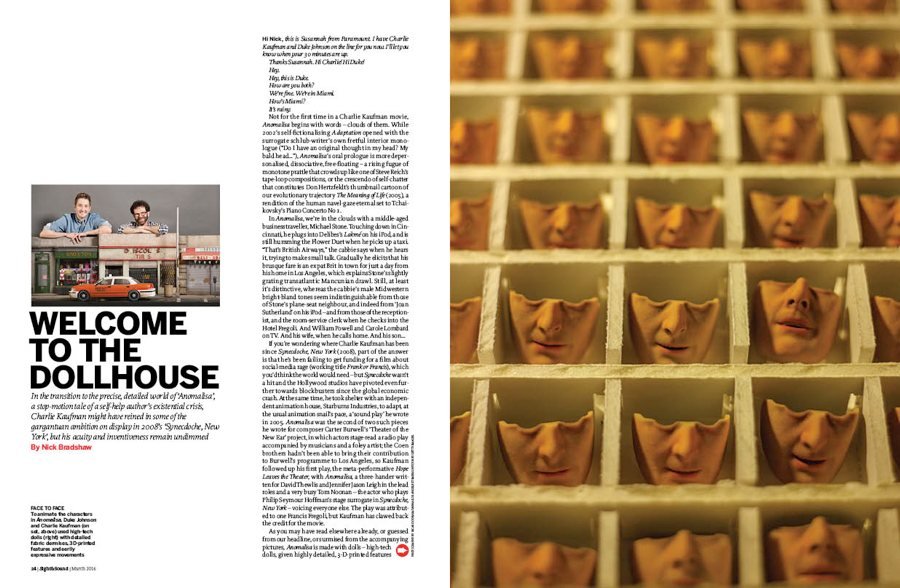
Welcome to the Dollhouse
In the transition to the precise, detailed world of Anomalisa, a stop-motion tale of a self-help author’s existential crisis, Charlie Kaufman might have reined in some of the gargantuan ambition on display in 2008’s Synecdoche, New York, but his acuity and inventiveness remain undimmed. By Nick Bradshaw.
Plus: Pulling the strings
Charlie Kaufman’s brilliant, funny, self-reflexive philosophical investigations trade on a neurotic vision of the self that is perpetually on the verge of catastrophic collapse. By Jonathan Romney.
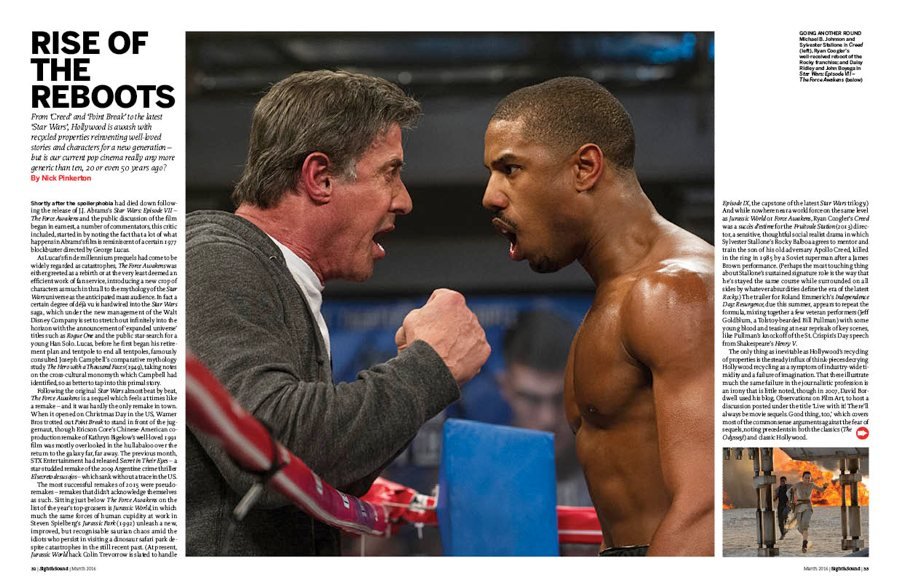
Rise of the Reboots
From Creed and Point Break to the latest Star Wars, Hollywood is awash with recycled properties reinventing well-loved stories and characters for a new generation – but is our current pop cinema really any more generic than ten, 20 or even 50 years ago? By Nick Pinkerton.
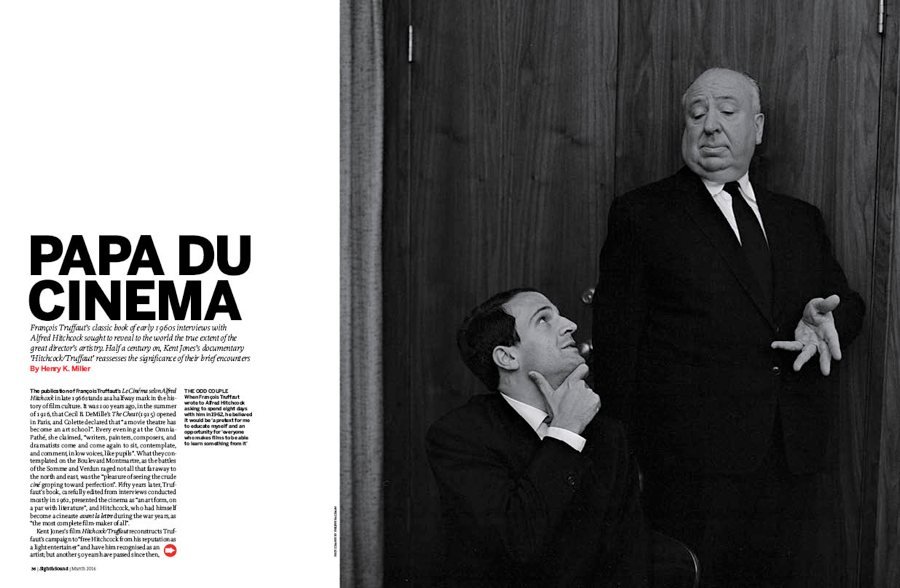
Papa du cinema
François Truffaut’s classic book of early 1960s interviews with Alfred Hitchcock sought to reveal to the world the true extent of the great director’s artistry. Half a century on, Kent Jones’s documentary Hitchcock/Truffaut reassesses the significance of their brief encounters. By Henry K. Miller.
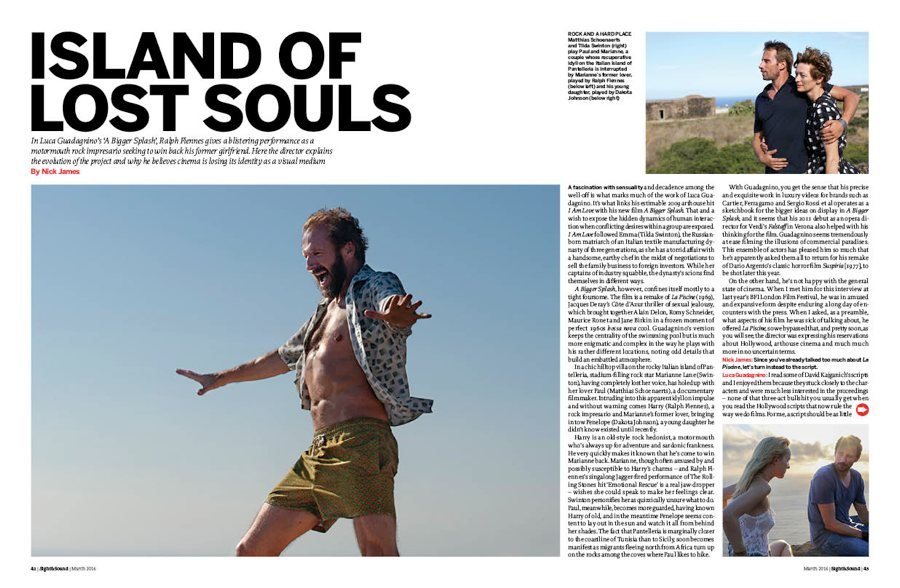
Island of Lost Souls
In Luca Guadagnino’s A Bigger Splash, Ralph Fiennes gives a blistering performance as a motormouth rock impresario seeking to win back his former girlfriend. Here the director explains the evolution of the project and why he believes cinema is losing its identity as a visual medium. By Nick James.
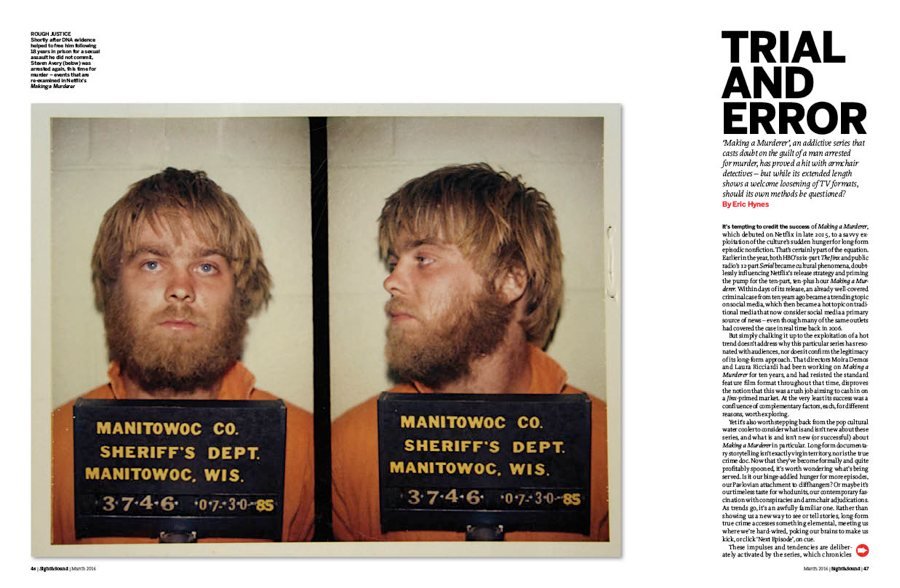
Trial and Error
Making a Murderer, an addictive series that casts doubt on the guilt of a man arrested for murder, has proved a hit with armchair detectives – but while its extended length shows a welcome loosening of TV formats, should its own methods be questioned? By Eric Hynes.
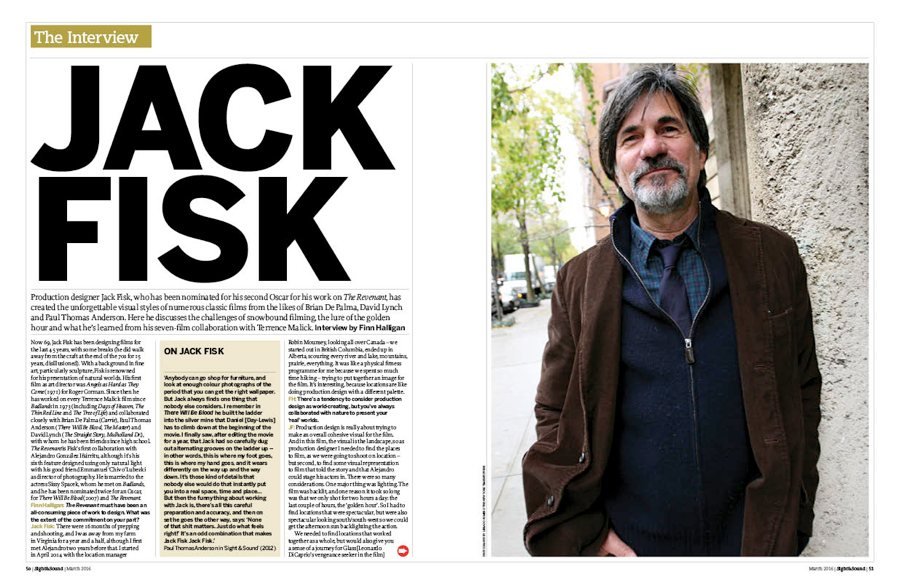
The
Production designer Jack Fisk, who has been nominated for his second Oscar for his work on The Revenant, has created the unforgettable visual styles of numerous classic films from the likes of Brian De Palma, David Lynch and Paul Thomas Anderson. Here he discusses the challenges of snowbound filming, the lure of the golden hour and what he’s learned from his seven-film collaboration with Terrence Malick. Interview by Finn Halligan.
Regulars
Editorial
Rushes
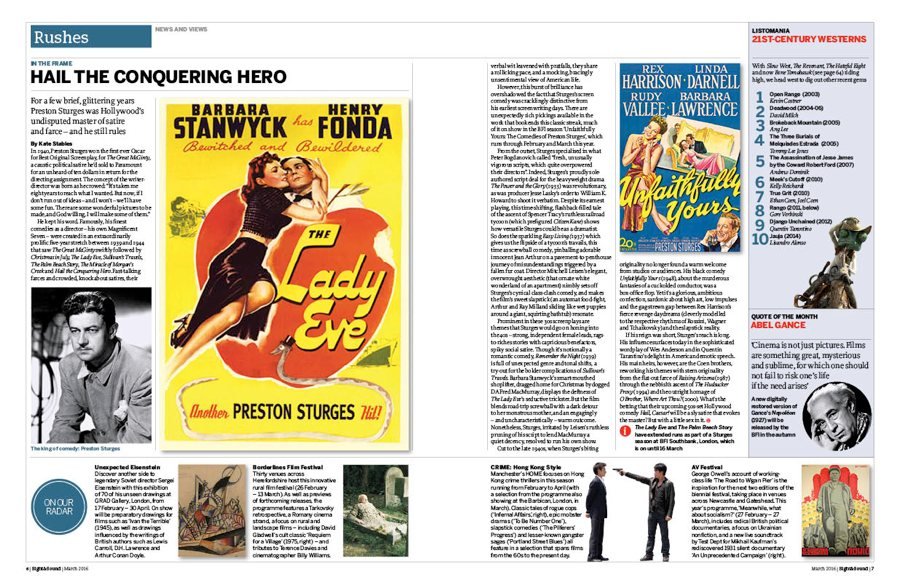
In the frame: Hail the conquering hero
For a few brief, glittering years Preston Sturges was Hollywood’s undisputed master of satire and farce – and he still rules. By Kate Stables.
Listomania: 21st-century westerns
Object lesson: Bringing up baby
The pram is emblematic of both the vulnerability of an infant, and the disproportionate physical and psychic space it occupies. By Hannah McGill.
The five key…: Puppet romances
Looking for romance with no strings attached? Wondering what gloves have got to do with it? You need our guide to puppet love. By Michael Brooke.
Interview: Stephen Fingleton
The director of The Survivalist talks about his post-apocalyptic vision of the future and the pressures of using the term ‘science fiction’. By Wendy Ide.
Dispatches: Walking tall
From The Wizard of Oz to the Before… trilogy, cinema is rife with movies that can be seen as constituting a genre of their own – walking films. By Mark Cousins.
Obituary: Ettore Scola, 1931-2016
The Oscar-nominated – and perpetually modest – screenwriter, director and prime exponent of ‘comedy Italian style’. By Pasquale Iannone.
The industry
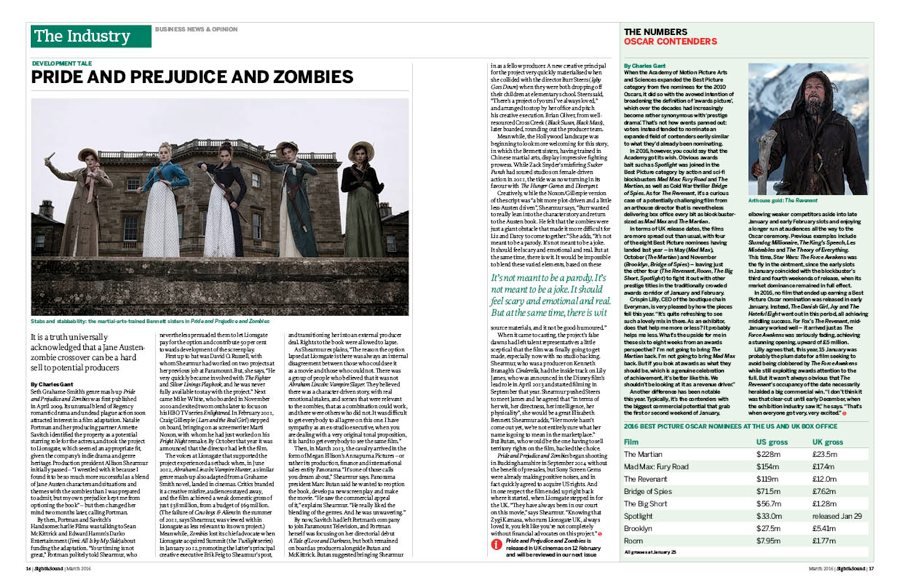
Development tale: Pride and Prejudice and Zombies
It is a truth universally acknowledged that a Jane Austen-zombie crossover can be a hard sell to potential producers. By Charles Gant.
The numbers: Oscar contenders
By Charles Gant.
Obituaries 2015
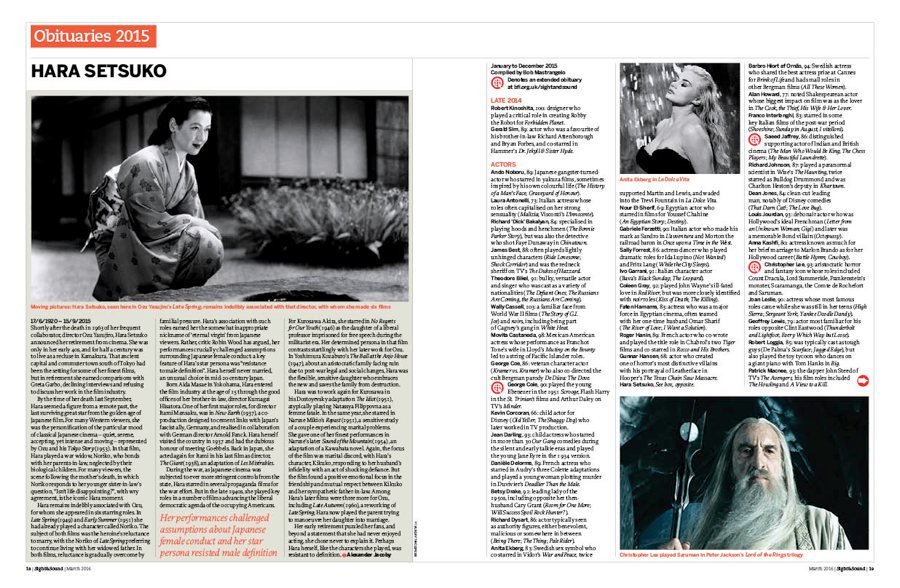
Compiled by Bob Mastrangelo, with the following extended entries:
Hara Setsuko by Alexander Jacoby.
Wes Craven by Anne Billson.
Haskell Wexler by Tom Charity.
Chantal Akerman by Laura Mulvey.
Wide angle
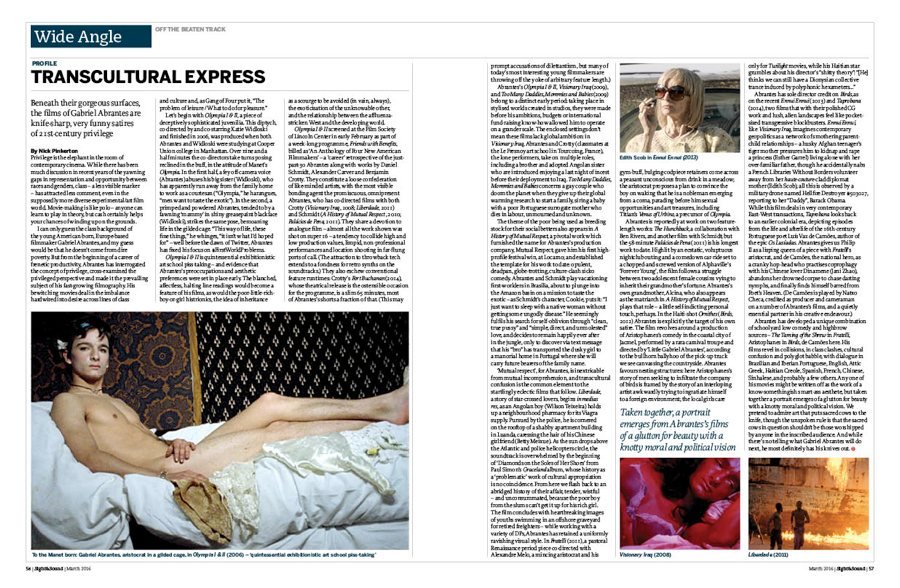
Profile: Transcultural express
Beneath their gorgeous surfaces, the films of Gabriel Abrantes are knife-sharp, very funny satires of 21st-century privilege. By Nick Pinkerton.
Soundings: Exclusion zone
Gangsta rap ought to make for great cinema – if only Hollywood could handle its contradictions and social realism. By Daniel Barrow.
Primal screen: the world of silent cinema
If festivals and DVD reissues are any measure, silent film is becoming ever more popular. But can it pay its way? By Neil Brand.
Website: The map and the territory
If you regard every film as a kind of map, and are less interested in the stars than in the streets where they are shot, you may be a cine-tourist. By Roland-François Lack.
Reconstruction: True détective
Through interviews, following clues and painstaking work in the archives, a lost Godard film has been restored to life. By Michael Witt.
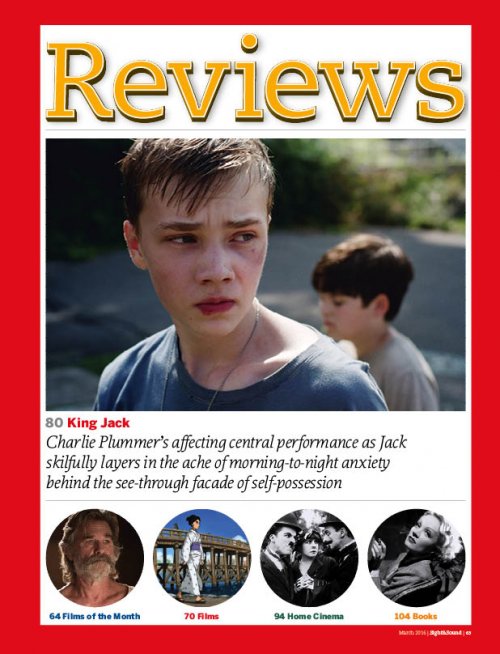
Reviews
Films of the month
Bone Tomahawk
Chronic
We Come as Friends
plus reviews of
Alvin and the Chipmunks: The Road Chip
Amazonia
Backtrack
A Bigger Splash
Capture the Flag
Concussion
Dirty Grandpa
Dragon Blade
The 5th Wave
The Forest
Freeheld
Goodnight Mommy
The Green Inferno
Hitchcock Truffaut
Ip Man 3
King Jack
Mavis!
Miss Hokusai
Noble
Orthodox
Patience, Patience You’ll Go to Paradise!
Point Break
The Propaganda Game
Ride Along 2
Strangerland
The Survivalist
Taking Stock
13 Hours: The Secret Soldiers of Benghazi
Time out of Mind
Triple 9
Truth
Uzumasa Limelight
The Visit An Alien Encounter
Wazir
Welcome to Leith
Home Cinema features
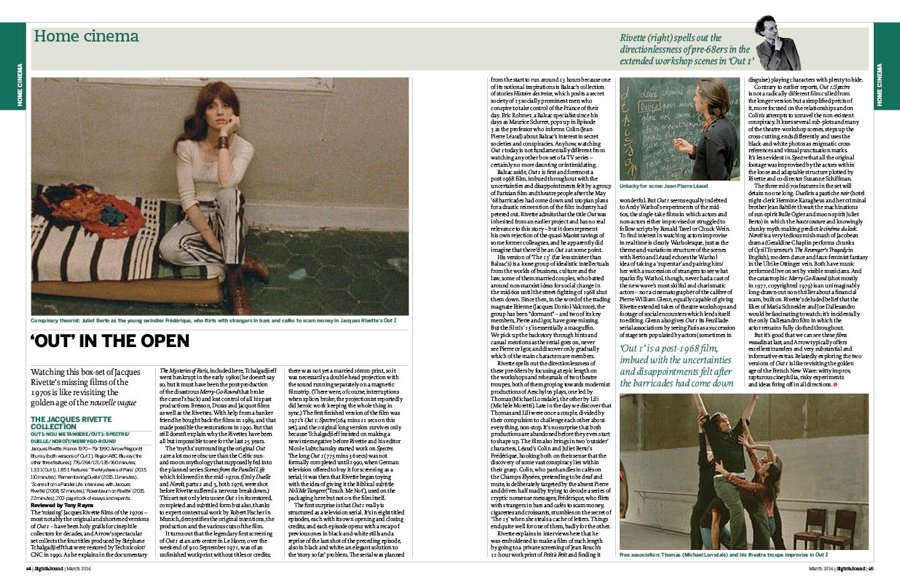
‘Out’ in the open: The Jacques Rivette Collection
Watching this box-set of Jacques Rivette’s missing films of the 1970s is like revisiting the golden age of the nouvelle vague. By Tony Rayns.
Revival: Julien Duvivier in the Thirties
The films they made together in the 1930s earn Julien Duvivier and his star Harry Baur a place in the cinematic pantheon. Reviewed by Ginette Vincendeau.
Rediscovery: Thundercrack!
Too daft for some, too explicit for most – but Curt McDowell’s cult curiosity is a riot if you’re on the right wavelength. By Michael Brooke.
Lost and found: The Secret Life of an American House Wife
Made just as the censors were loosening their grip, this comedy of marital manners reflects the new permissiveness of its era. By Anne Billson.
plus reviews of
The Apu Trilogy
Bitter Rice
Ghost Story
Je t’aime je t’aime
Love on the Dole
Mandingo
Offbeat
The Quiet Man
River’s Edge
Sherlock Holmes
Television
The Evolution of the British TV Documentary. Volume I: BBC 1952-67 reviewed by Robert Hanks
Books
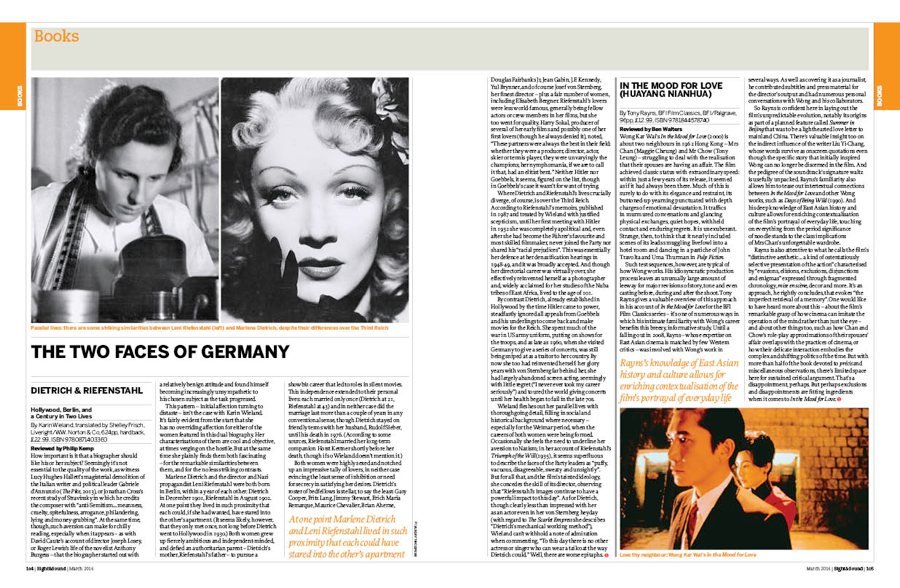
Dietrich & Riefenstahl: Hollywood, Berlin, and a Century in Two Lives by Karin Wieland, translated by Shelley Frisch (Liveright/W.W. Norton & Co) reviewed by Philip Kemp
In the Mood for Love (Huayang Nianhua) by Tony Rayns (BFI Film Classics, BFI/Palgrave) reviewed by Ben Walters
L.A. Rebellion: Creating a New Black Cinema edited by Allyson Nadia Field, Jan-Christopher Horak and Jacqueline Najuma Stewart, reviewed by Ashley Clark
Letters
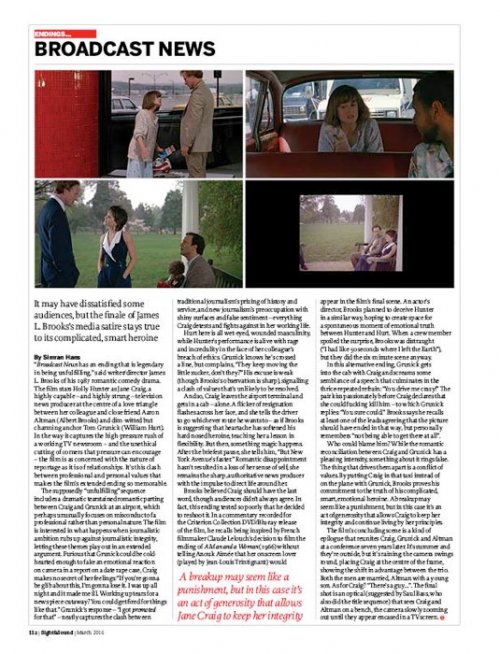
Endings
Broadcast News
It may have dissatisfied some audiences, but the finale of James L. Brooks’s media satire stays true to its complicated, smart heroine. By Simran Hans.
Further reading
-
The Digital Edition and Archive quick link
Log in here to your digital edition and archive subscription, take a look at the packages on offer and buy a subscription.




